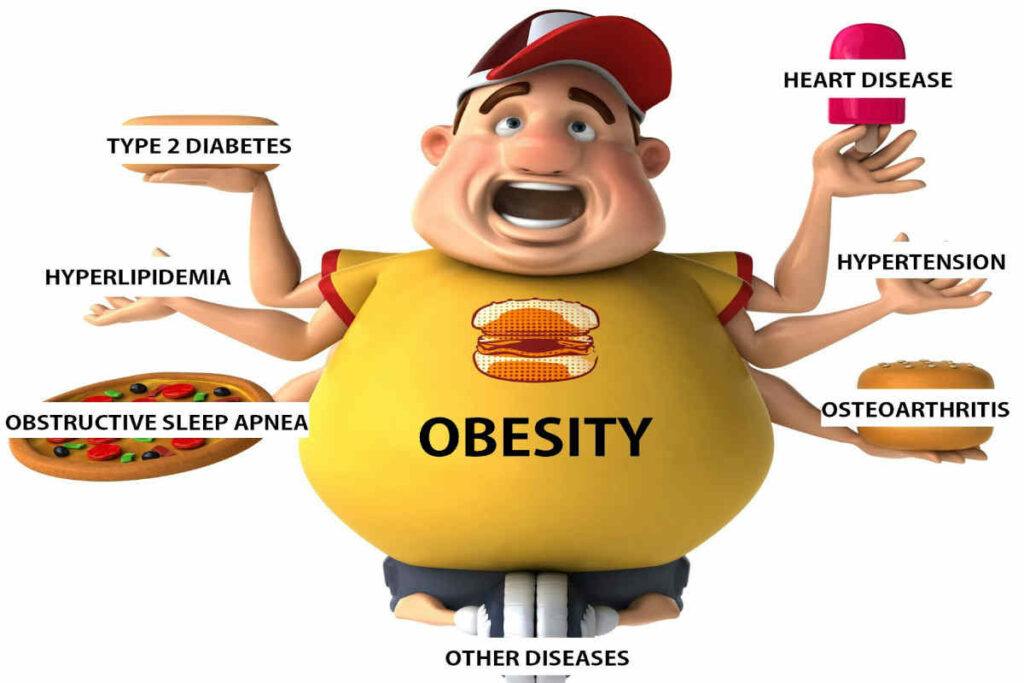In a world where obesity rates continue to rise, the quest for effective solutions is more critical than ever. GLP-1, a groundbreaking weight loss treatment, has been making waves in the field of obesity management. In this blog post, we’ll explore the role of GLP-1 in managing obesity-related health issues.
Understanding the Obesity Epidemic
Obesity, characterized by excessive body fat, isn’t merely about appearances. It’s a complex health issue associated with a range of conditions, including type 2 diabetes, high blood pressure, heart disease, and more. Managing obesity is not just about shedding pounds; it’s about improving overall health and quality of life.
Adverse Effects of Obesity
 Obesity is not just a matter of carrying excess weight; it’s associated with a range of adverse health effects that can significantly impact one’s quality of life. These effects include:
Obesity is not just a matter of carrying excess weight; it’s associated with a range of adverse health effects that can significantly impact one’s quality of life. These effects include:
- Type 2 Diabetes: Obesity is a leading cause of type 2 diabetes, a chronic condition that affects blood sugar regulation and can lead to a host of complications.
- High Blood Pressure: Excess weight often leads to hypertension, increasing the risk of heart disease, stroke, and other cardiovascular issues.
- Cardiovascular Disease: Obesity is a key contributor to heart disease, including atherosclerosis, heart attacks, and heart failure.
- Joint Problems: The excess strain on the joints can lead to osteoarthritis, chronic pain, and limited mobility.
- Respiratory Issues: Obesity can cause or exacerbate conditions like sleep apnea and asthma, making it harder to breathe and get a good night’s sleep.
- Mental Health Challenges: The social stigma associated with obesity can lead to depression, anxiety, and a lower quality of life.
The Science Behind GLP-1
GLP-1 is a hormone produced naturally in the gut that regulates blood sugar levels and controls appetite.
- Curbs Appetite: GLP-1 signals to the brain that you’re full, helping to reduce calorie intake.
- Slows Gastric Emptying: GLP-1 delays stomach emptying, leading to a feeling of fullness and reduced hunger between meals.
- Manages Blood Sugar: It improves blood sugar control, particularly beneficial for individuals with type 2 diabetes.
Susan’s Journey to Better Health
Susan, a 45-year-old mother of two, had been struggling with obesity for years. Her health was deteriorating, and her risk of diabetes and heart disease was a growing concern. After consulting with her healthcare provider, she began taking GLP-1. With the guidance of her healthcare team, Susan combined GLP-1with a balanced diet and regular exercise. Over time, she noticed a significant reduction in her weight, and her blood sugar levels became more stable. Susan’s journey is a testament to the positive impact GLP-1 can have on managing obesity-related health issues.
Mark’s Transformation to a Healthier Life
Meet Mark, a 52-year-old professional who had long neglected his health due to a demanding job and unhealthy eating habits. As his weight increased, so did his concerns about obesity-related health issues. Mark’s turning point came when his healthcare provider recommended GLP-1. With dedication and support, Mark began his journey to better health. He embraced a balanced diet and exercise regimen, complemented by GLP-1. Over time, Mark not only shed excess weight but also noticed improvements in his blood pressure and cholesterol levels. His journey demonstrates that managing obesity-related health issues with GLP-1 is a life-changing decision.
Research-Based Evidence: GLP-1’s Efficacy
- A study published in the New England Journal of Medicine revealed that individuals treated with GLP-1 lost, on average, over 15% of their body weight over 68 weeks.
- Research in JAMA demonstrated that GLP-1 significantly outperformed a placebo in helping participants lose weight, with minimal side effects.
- GLP-1’s potential to improve cardiovascular risk factors, such as high blood pressure and cholesterol, underscores its role in managing obesity-related health issues.
How GLP-1 Improves Obesity-Related Issues
GLP-1’s impact on obesity-related health issues is transformative. By effectively reducing appetite, delaying stomach emptying, and regulating blood sugar, GLP-1 addresses many of the concerns that accompany obesity. For those at risk of or already living with type 2 diabetes, GLP-1 can help manage blood sugar levels, reducing the need for medication and insulin injections. This not only enhances physical well-being but also alleviates the mental and emotional burden that often accompanies diabetes management. Furthermore, by promoting significant weight loss, GLP-1 can alleviate the strain on joints, potentially improving mobility and reducing the risk of chronic pain or joint-related conditions. As cardiovascular disease is a leading cause of mortality associated with obesity, GLP-1’s ability to reduce weight and enhance cardiovascular health is a pivotal step toward a healthier future.
Conclusion
In summary, GLP-1’s multifaceted approach to managing obesity not only addresses weight loss but also directly impacts obesity-related health issues. This makes GLP-1 a powerful tool in the quest for better health and improved quality of life, offering hope and optimism for those on the journey to managing obesity-related concerns.




















